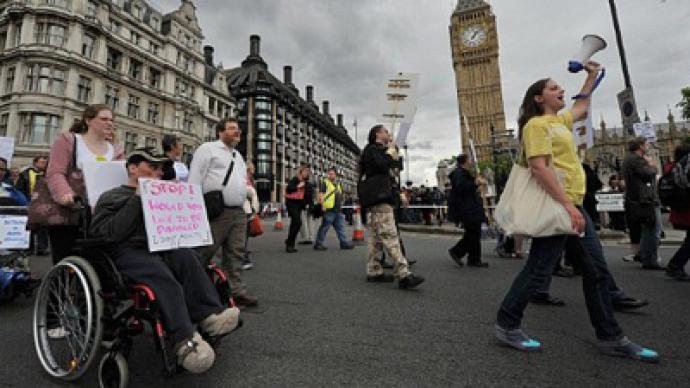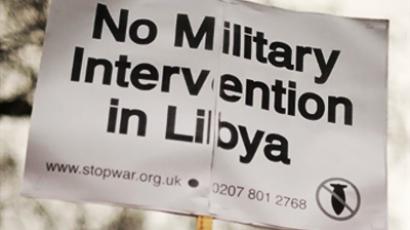UK civil servants mount major strike against pension reform

More than half a million UK public sector workers are involved in industrial action to protest against government plans to change their pensions and freeze pay. Schools are closed and transport is being badly affected by the workers’ one-day strike.
Down tools, up with industrial action. An autumn of discontent begins in the UK, as the country braces for a wave of strikes, not seen for decades.This time, it is three quarters of a million public sector workers walking out, unhappy with the planned reform of their pensions, which they say will see them paying a lot more and getting a lot less.“We don’t think there should be a race to the bottom with pensions. We think everyone deserves to have security in retirement,” says one member of the UK Public Sector Trade Union.“People are talking about withdrawing from the pension scheme because they can’t afford to pay the mortgage at the same as paying for their pensions. People are really angry that at the time when bankers are making record bonuses, yet again we are being asked to take a cut in our pensions, to pay more for our pensions,” says another. “The reality is – we‘ve got to fight or else we will lose everything,” thinks a third. These people do a huge variety of key work – from teachers and lecturers to air-traffic controllers and coastguards.Unison is the UK’s biggest public sector trade union. Deputy chief Bob Abberley, says his 1.3 million members are ready for prolonged industrial action.“We’re on a war footing. We’ve got 30 million pounds set aside, and we’ve got a strategy worked out,” he told RT. “But I must stress, that’s not what we want. We want to talk to the government and negotiate a sensible package, but that’s not the ridiculous package they’re proposing at the moment.”That package involves raising the retirement age from 60 to 66, raising pension contributions by workers, and having payouts based on average career earnings, rather than final salary.People say they want to attain dignity and do not want to work longer hours for less money.“We are going to have to pay more for a pension, get less pension, and work for more years,” says one protester. “The cuts are being made in wrong directions,” says another. “They are not being made towards the individuals responsible for the current financial crisis."The unions admit public support is fundamental to having a successful strike action. The government is very unlikely to change its mind about reforms if the public at large does not back the unions. But that is by no means assured.“Public sector workers do already get very generous pensions, and the cost of those pensions is very much swept under the carpet,” argues Professor Philip Booth from London’s Institute of Economic Affairs. “The burden falls onto the next generation. It’s really essential that public sector pensions are reformed. And even after they’re reformed, public sector workers will still get better pensions than most private sector workers.”The unions want to apply enough pressure to force the government to change its mind – and it is no stranger to u-turns. It was hell-bent on reforming the health service too, until it decided to take longer to think about it, causing friction in the coalition. The government’s doing this to reduce a current $50 billion pension bill – but it may be cutting off its nose to spite its face.There is a wider issue here, according to the unions. UK pension funds are huge investors in the UK economy. If public sector workers no longer think their pensions are worthwhile, they may stop contributing to them. If there was a widespread withdrawal, pension funds would collapse. And that would leave UK PLC very short of investment, just when it needs it more than ever. The unions will be stressing that, but the question remains as to whether or not the government is listening.
Watch RT's Laura Emmett's report
Political activist Professor Chris Knight argues that what is happening in the UK and other European countries is a crisis caused by bankers which should not be solved at the expense of hardworking people.“The crisis has been caused by the bankers, who’ve got the politicians in their pocket. They make simple people act as if hardworking teachers, hardworking civil servants, hardworking lecturers and others are responsible for this crisis. We all know that it’s not true. Let’s deal with the problem at its root. Let’s crack down on what I regard as actually electoral fraud and criminal activity. Let’s crack down on it right across Europe,” professor Knight told RT.
Andrew Burgin, a secretary from Coalition of Resistance movement in London, believes this industrial action is likely to have no direct effect on the government's proposed plans in the short-term.“This today’s strike of four unions is the beginning of an industrial struggle from a low level of industrial action in this country,” he said. “But in the long-term, it is very possible that there will be many millions of workers on strike and the government will be forced then take notice."
Meanwhile, activists agree that making the government change its mind will not be easy. “The government is putting on a brave face, and it’s going to be no easy fight to stop these cuts,” Daniel Garvin, an activist from the anti-tax avoidance group “UK Uncut” told RT. “We are dealing with a very ideological government. They are making the deepest cuts since Margaret Thatcher did. No one in the country thinks this is going to be an easy pushover. I believe everyone in every union needs to step up. One day will not be enough. We need a sustained approach.”














